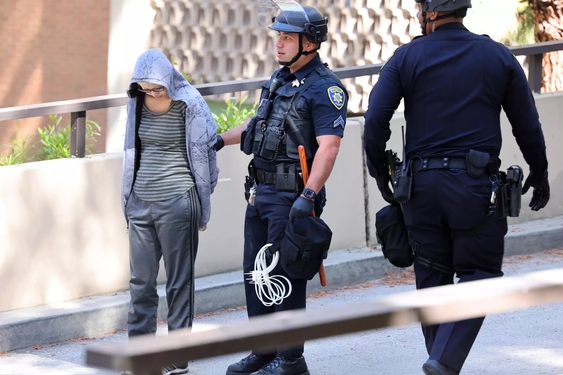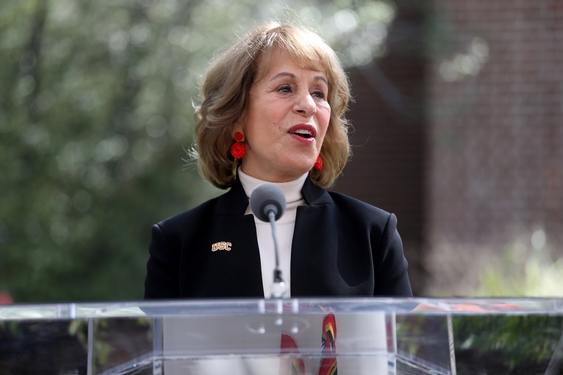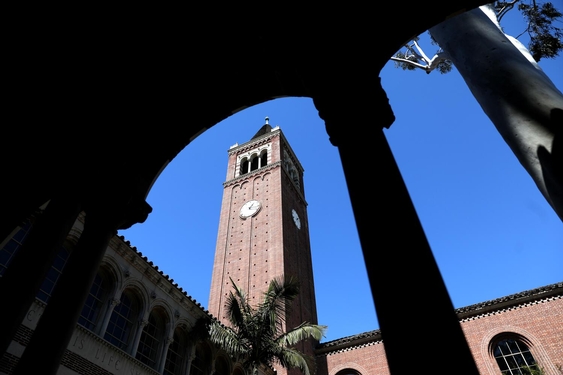Cal State University trustees on Wednesday approved a controversial 6% annual tuition increase for the next five years, despite fierce opposition from scores of students who say they are financially struggling and can ill-afford to pay more to attend college.
The increase — the system's first since 2017 — is projected to raise $840 million over the five years and is badly needed to help bridge a $1.5-billion budget gap that has forced campuses to skip employee wage increases and building renovations, administrators said.
For full-time undergraduate students, the tuition hike amounts to an increase of $342 per student to $6,084 in the 2024-25 academic year. By 2028-29, tuition would jump to $7,682.
The hike will help pay for employee pay increases, improve academic support and research and internship opportunities for students and enhance course options, administrators said. The system plans to earmark $280 million of the money raised from tuition increases for financial aid.
Since initially proposing a tuition increase earlier this year, Cal State officials have consistently said they plan to keep the system affordable for low-income students, many of them students of color. They say about 60% of the roughly 460,000 students enrolled in CSU will continue to have their tuition costs fully covered by financial aid.
The 23-campus system remains one of the most affordable four-year public higher education systems in the nation.
But students who descended on the trustees meeting Tuesday for a public hearing and rally argued it is unfair to assume those students and their families can afford to shoulder the added costs.
Leila Cormier, a political science student at Sacramento State University, said she works three jobs at more than 40 hours a week to pay the 30% share of her tuition that financial aid does not cover. She constantly seeks out scholarships to avoid taking out loans.
The 20-year-old receives some help from her mother, but it's a struggle each month to make her $1,500 in rent. She chose to enroll in the Cal State system for it's relative affordability, but feels the system's leaders are not taking into account students' financial hardships.
"I don't really feel like they're listening," she said. "We feel like they are ignoring us."
During Tuesday's raucous hearing that lasted more than two hours, some students urged the trustees to scrap the tuition increase and find other solutions to the system's budget woes. Others implored the group to delay the vote until November to give more students time to learn about the plan. At least one campus, Cal Poly San Luis Obispo, has not started fall classes.
Terrie Kennon, president of the Black Student Union at Cal State Dominguez Hills, said she had learned of the proposal to increase tuition only a week ago through social media and the California Faculty Assn. She said the system had not done nearly enough to engage with students about the tuition hikes. She spent much of the week trying to inform her peers of the increase by hosting workshops on campus.
"I had three days to organize a protest on my campus, three days to gather as many students as possible to make this happen," she said.
The California Faculty Assn. joined students in opposition to the hikes. The union is one of several labor groups pushing for higher salaries but does not support increasing tuition to fund them. Charles Toombs, association president, has said the union favors cutting "administrative bloat."
Outside the meeting Tuesday, students who protested alongside labor unions advocating for wage increases banged on plastic buckets and led chants for several hours. They shouted, "Shut it down."
Students representing campuses as far north as Cal Poly Humboldt voiced their discontent. Jordan Guillory, a graduate student studying math, drove seven hours — leaving at 7 p.m. after teaching a class on Monday — from San Francisco State University to protest.
Guillory makes about $900 a month as a graduate student teacher — $800 of which pays for the room he rents in a converted garage. He borrowed $7,000 this academic year to pay for tuition and other costs.
As a graduate student, Guillory's annual tuition is set to increase by $432 to $7,608 in the 2024-25 school year. For graduate students, by 2028-29 tuition would jump to $9,612.
"I'd have put that in loans and trust that this system is training me to get a job that can pay that off in a reasonable time," he said. "I'm not necessarily sure that's promising."
The 23-year-old said he is thinking about going into teaching to qualify for loan forgiveness awarded to people who work in public service.
"If that doesn't work, I'll be in a lot of trouble in the future," he said. "But I just choose not to think about that."
This story originally appeared in Los Angeles Times.
©2023 Los Angeles Times. Visit latimes.com. Distributed by Tribune Content Agency, LLC.












